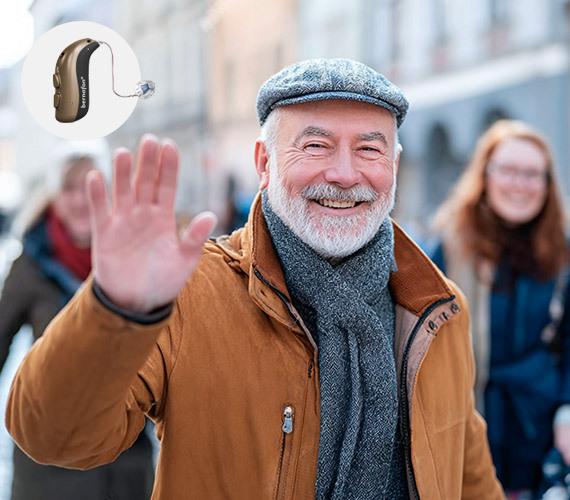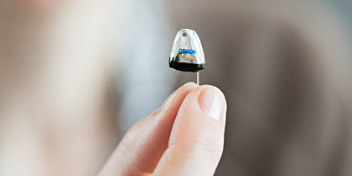Find out more about Oticon Zeal
Sensorineural hearing loss

What is sensorineural hearing loss?
Sensorineural hearing loss is the most common of the three types of hearing loss (the other two being conductive hearing loss and mixed hearing loss).
This type of hearing loss means that the tiny hair cells in the inner ear or the auditory nerve (responsible for carrying sound to the brain) are damaged. It's usually caused by either the natural ageing process or by exposure to loud sounds.


Book a free test for sensorineural hearing loss
What causes sensorineural hearing loss?
Sensorineural hearing loss happens when there's damage to the tiny hair cells in the inner ear or the auditory nerve. The reasons behind this include:
- Ageing – Age-related hearing loss, or presbycusis, is the most common form of sensorineural hearing loss
- Exposure to loud sounds, such as a one-time explosion or continuous exposure to loud sounds over time
- Certain drugs and medications
- Genetics or complications during birth and pregnancy
What is sudden sensorineural hearing loss?
Sudden sensorineural hearing loss (SSNHL) – known as sudden deafness – involves an unexplained, rapid loss of hearing all at once or over a couple of days. It almost always occurs just in one ear.
If you experience sudden hearing loss, call your GP or seek medical advice immediately.
6 common signs of sensorinerual hearing loss
It can be difficult to identify the signs and symptoms of sensorineural hearing loss. Below are six common signs to look out for:

How is sensorineural hearing loss treated?
Sensorineural hearing loss can often be treated with hearing aids. These come in many different styles, with plenty of options to suit your needs and preferences.
It's important to get treatment for sensorineural hearing loss as soon as possible. Leaving hearing loss untreated can have negatively affect your well-being. For example, it can decrease your quality of life and cause loneliness.
Prevent hearing loss before it impacts you or a loved one
Even if you don't currently have symptoms of hearing loss, you can still be proactive in preventing it. Using hearing protection, such as ear plugs, moulds or defenders, is one effective way to prevent hearing loss. This will help to protect your ears from sounds like:
- Garden tools, e.g. lawnmowers and leaf blowers
- Woodworking machinery
- Loud appliances
- Work-related exposure, including factories and construction sites
- Snowmobiles
- Music
Excessively loud, everyday sounds, both at home and at work, can pose a risk to your hearing health. So it's a good idea to invest in hearing protection if you expect to be exposed to loud noise. Avoiding loud sounds can benefit your long-term hearing health.
Sources
1. https://www.healthyhearing.com/report/50276-Common-causes-of-sensorineural-hearing-loss
2. https://www.cochranelibrary.com/cdsr/doi/10.1002/14651858.CD006987.pub2/full
3. https://medlineplus.gov/ency/article/003291.htm











